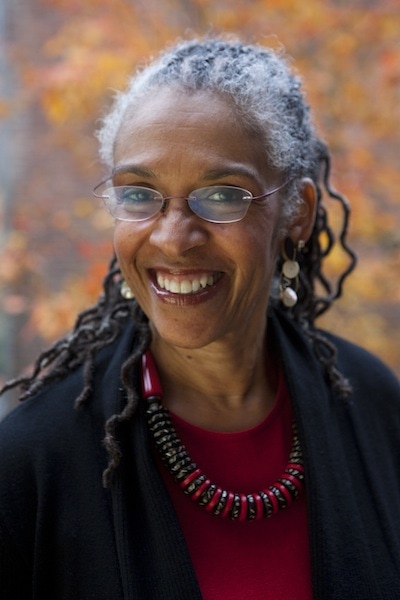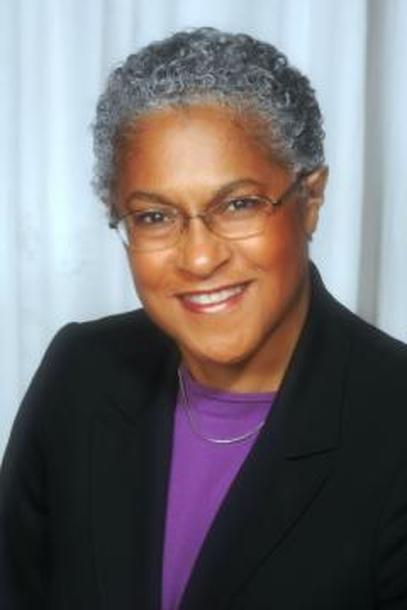Intersectionality and Critical Race Theory: A Dialogue - 12:15 pm
Pioneers in the field discuss intersectionality, critical race theory, and black digital scholarship.
featuring Bonnie Thornton Dill and Patricia Hill Collins. In conjunction with the African American History, Culture, and Digital Humanities initiative
featuring Bonnie Thornton Dill and Patricia Hill Collins. In conjunction with the African American History, Culture, and Digital Humanities initiative
PANELISTS
|
Bonnie Thornton Dill is dean of the College of Arts and Humanities and professor of Women’s Studies. A pioneering scholar studying the intersections of race, class and gender in the U.S. with an emphasis on African American women, work and families, Thornton Dill’s scholarship has been reprinted in numerous collections and edited volumes. Her recent publications include an edited collection of essays on intersectionality with Ruth Zambrana entitled Emerging Intersections: Race, Class, and Gender in Theory, Policy, and Practice (Rutgers University Press, 2009), and numerous articles.
Prior to assuming the position of dean, Thornton Dill chaired the Women’s Studies Department for eight years. In addition, she has worked with colleagues to found two research centers that have been national leaders in developing and disseminating the body of scholarship that has come to be known by the term “intersectionality.” Today she holds the title of Founding Director for both the Center for Research on Women at the University of Memphis and the Consortium on Race, Gender and Ethnicity at the University of Maryland. She is currently President of the National Women’s Studies Association (2010-2012) and prior to that was Vice President of the American Sociological Association. Thornton Dill also serves as Chair of the Advisory Board of Scholars for Ms. Magazine. Professor Thornton Dill has won a number of prestigious awards including two awards for mentoring; the Jessie Bernard Award and the Distinguished Contributions to Teaching Award both given by the American Sociological Association; the Eastern Sociological Society’s Robin Williams Jr. Distinguished Lectureship; and in 2009-2010, was appointed Stanley Kelley, Jr. Visiting Professor for Distinguished Teaching in the Department of Sociology at Princeton University. Her current research pulls together her knowledge and experience as a teacher, mentor and institution builder around issues of race/ethnicity, class and gender in higher education to examine the experiences of historically underrepresented minority faculty in research universities, focusing specifically upon the impact of occupational stress on their physical and mental health and their career paths. |
Professor Collins is a social theorist whose research and scholarship have examined issues of race, gender, social class, sexuality and/or nation. Her first book, Black Feminist Thought: Knowledge, Consciousness, and the Politics of Empowerment (Routledge), published in 1990, with a revised tenth year anniversary edition published in 2000, won the Jessie Bernard Award of the American Sociological Association (ASA) for significant scholarship in gender, and the C. Wright Mills Award of the Society for the Study of Social Problems. Her second book, Race, Class, and Gender: An Anthology, 8th ed. (2013), edited with Margaret Andersen, is widely used in undergraduate classrooms in over 200 colleges and universities. Black Sexual Politics: African Americans, Gender, and the New Racism (Routledge, 2004) received ASA’s 2007 Distinguished Publication Award. Her other books include Fighting Words: Black Women and the Search for Justice (University of Minnesota Press, 1998); From Black Power to Hip Hop: Racism, Nationalism, and Feminism (Temple University Press 2005); Another Kind of Public Education: Race, Schools, the Media and Democratic Possibilities (Beacon Press, 2009); the Handbook of Race and Ethnic Studies, edited with John Solomos (Sage, 2010); and On Intellectual Activism (Temple University Press, 2012). She has published many articles in professional journals such as the Journal of Speculative Philosophy, Qualitative Sociology, Ethnic and Racial Studies, the American Sociological Review, Signs, Sociological Theory, Social Problems, and Black Scholar, as well as in edited volumes. Professor Collins has taught at several institutions, held editorial positions with professional journals, lectured widely in the United States and abroad, served in many capacities in professional organizations, and has acted as consultant for a number of businesses and community organizations. In 2008, she became the 100th President of the American Sociological Association, the first African American woman elected to this position in the organization’s 104-year history. Professor Collins also holds an appointment as the Charles Phelps Taft Emeritus Professor of Sociology within the Department of African American Studies at the University of Cincinnati. Professor Collins’s current research interests lie in the following sociology of knowledge projects: (1) the epistemology of intersectionality, specifically, analyzing how race, class, gender, sexuality, ethnicity, nation and/or age mutually construct one another as systems of power and as theoretical constructs; (3) exploring epistemologies of emancipatory knowledges, for example, critical race theory, nationalism and feminism; and (3) examining how African American male and female youth's experiences with social issues of education, unemployment, popular culture and political activism articulate with global phenomena, specifically, complex social inequalities, global capitalist development, transnationalism, and political activism.
|



